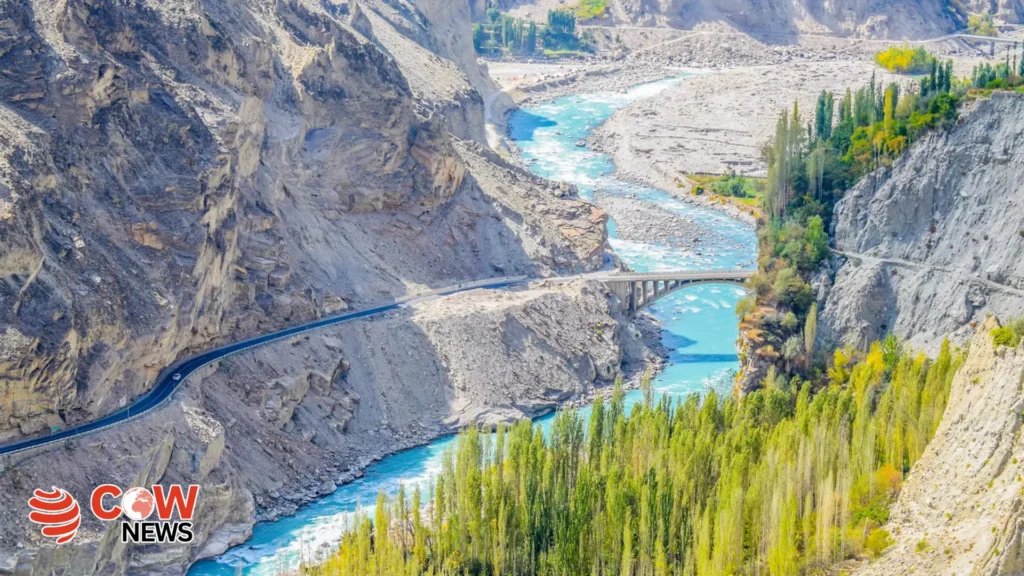BY UME KULSOOM
The world is rapidly succumbing to the devastating effects of climate change. From scorching heatwaves and unpredictable rainfall to hurricanes, wildfires, and melting glaciers, extreme weather events are becoming alarmingly frequent. Experts warn that if immediate and effective measures are not taken, this crisis will have catastrophic consequences for future generations. Climate change is no longer a distant threat; it is a present reality, and its impacts are being felt across the globe, including in countries like Pakistan, which is among the most vulnerable.
Climate change refers to the long-term increase in Earth’s temperature and the resulting shifts in weather patterns. For centuries, the planet’s temperature has fluctuated due to natural factors. However, in recent decades, industrial growth and human activities have accelerated this process to dangerous levels. The primary driver of this acceleration is the excessive emission of greenhouse gases, such as carbon dioxide, methane, and nitrous oxide, which trap heat in the atmosphere and cause global temperatures to rise.
Several factors contribute to climate change, including:
- Greenhouse Gas Emissions: The burning of fossil fuels in industries, vehicles, and energy production releases vast amounts of carbon dioxide and other gases, intensifying the greenhouse effect.
- Deforestation: Trees absorb carbon dioxide and help regulate the planet’s temperature. However, rampant deforestation has disrupted this balance, exacerbating global warming.
- Industrial Pollution: Factories and power plants emit smoke and chemicals that pollute the air, increasing the concentration of toxic gases in the atmosphere.
- Urbanization: Rapid urban development and the widespread use of concrete have created “heat islands,” where cities experience significantly higher temperatures than surrounding rural areas.
Climate Change in Pakistan: A Case Study

Pakistan is one of the countries most severely affected by climate change. The nation is experiencing a range of extreme weather events, which are disrupting lives, damaging infrastructure, and threatening food security. Some of the most pressing impacts include:
- Rising Temperatures: Over the past few decades, temperatures in Pakistan have soared to record highs. In 2022, Jacobabad recorded a staggering 51°C, a temperature considered extremely dangerous for human health.
- Erratic Monsoons: Climate change has disrupted monsoon patterns, leading to unpredictable and intense rainfall. The devastating floods of 2022 displaced over 8 million people and caused economic losses exceeding $30 billion.
- Glacier Melting: Pakistan is home to more than 7,000 glaciers, many of which are melting at an alarming rate. If this trend continues, the country could face severe water shortages in the future.
- Agricultural Challenges: As an agrarian economy, Pakistan relies heavily on its crops. However, climate change is threatening food security, with extreme heat, irregular rainfall, and water scarcity affecting the production of wheat, rice, and other essential crops.
Climate change is not just a human crisis; it is also a threat to the planet’s biodiversity. Rising temperatures, deforestation, and shifting weather patterns are forcing many species to abandon their natural habitats and migrate to new areas. In Pakistan, several rare and endangered species, such as the snow leopard, markhor, and Sindh deer, are at risk of extinction. Additionally, changes in temperature and rainfall patterns are disrupting food sources for wildlife, affecting their reproduction and survival.
Read more: Top 10 Places to Visit in Pakistan
Government Initiatives and Challenges


The Pakistani government has taken some steps to address climate change, including the ambitious “Billion Tree Tsunami” project and the formulation of a Climate Change Policy. However, the implementation of these initiatives faces significant challenges, such as insufficient funding, lack of policy continuity, and limited public awareness. Without addressing these issues, the effectiveness of such measures will remain limited.
The Way Forward: Combating Climate Change


To mitigate the effects of climate change, a collective and multi-faceted approach is essential. Here are some key steps that must be taken:
- Reforestation: Planting trees on a massive scale can help absorb carbon dioxide and restore ecological balance.
- Stricter Environmental Regulations: Governments must enforce stringent laws to reduce pollution and hold industries accountable for their emissions.
- Renewable Energy: Transitioning to solar, wind, and other renewable energy sources is crucial to reducing reliance on fossil fuels.
- Public Awareness: Educational institutions, media, and social media platforms must play a role in educating the public about the impacts of climate change and ways to combat it.
- Water Conservation: Building dams and adopting modern agricultural techniques can help reduce water wastage and ensure sustainable water management.
- Sustainable Transportation: Promoting public transport and electric vehicles can significantly reduce air pollution.
Climate change is a global crisis that requires immediate action. While countries like Pakistan are disproportionately affected, the responsibility to address this issue lies with the entire world. Governments, environmental experts, and citizens must work together to implement practical solutions. The time for rhetoric is over; it is now time for action.
The stakes are high, and the consequences of inaction are dire. Rising sea levels, food shortages, mass migrations, and the loss of biodiversity are just some of the potential outcomes if we fail to act. However, by taking decisive steps today, we can pave the way for a greener, more sustainable, and secure future.
Tackling Climate Change to Protect Pakistan’s Future and Our Planet”


Climate change is no longer a distant threat; it is a present reality, demanding immediate attention. The effects of global warming are already being felt worldwide, with extreme weather events, rising temperatures, and ecological disruptions becoming more frequent and severe. For countries like Pakistan, this crisis poses significant risks to the economy, environment, and public health, making it one of the frontlines in the global battle against climate change.
Pakistan’s vulnerability is evident. From devastating floods to intense heatwaves, the impacts are increasingly noticeable and hard to ignore. The rising temperatures exacerbate water scarcity, harm agriculture, and threaten biodiversity, all of which are essential to the country’s survival. The economic burden of dealing with these changes is immense, with losses in productivity, agricultural output, and infrastructure damage.
However, despite these grim challenges, there is still hope. A sustainable future is within reach if nations, including Pakistan, commit to urgent action. Transitioning to renewable energy, promoting energy efficiency, and investing in climate-resilient infrastructure are key steps toward mitigating the impacts of climate change. In Pakistan, there has been increasing interest in solar and wind energy, but much more needs to be done to accelerate this shift and reduce dependency on fossil fuels.
Public awareness plays a critical role in this fight. Individuals, communities, and businesses must embrace eco-friendly practices, reduce waste, and support climate-friendly policies. The government’s responsibility is to lead by example, implementing laws and policies that support sustainability, but it is equally important for the public to hold leaders accountable and engage in climate action at every level.
The fight against climate change is not just the responsibility of governments or large organizations. Every individual has a part to play in mitigating its effects. Whether through reducing carbon footprints, conserving water, or supporting green initiatives, collective action can make a difference. The need for global solidarity has never been more urgent. Climate change knows no borders, and it is only by working together that we can hope to protect our planet for future generations.
Now is the time for action. The window to address this crisis is rapidly closing. The future of our planet, and the survival of vulnerable nations like Pakistan, depends on the choices we make today. Our planet, our home, is in jeopardy—its future is in our hands. Let us act decisively to build a sustainable, resilient future for all.
